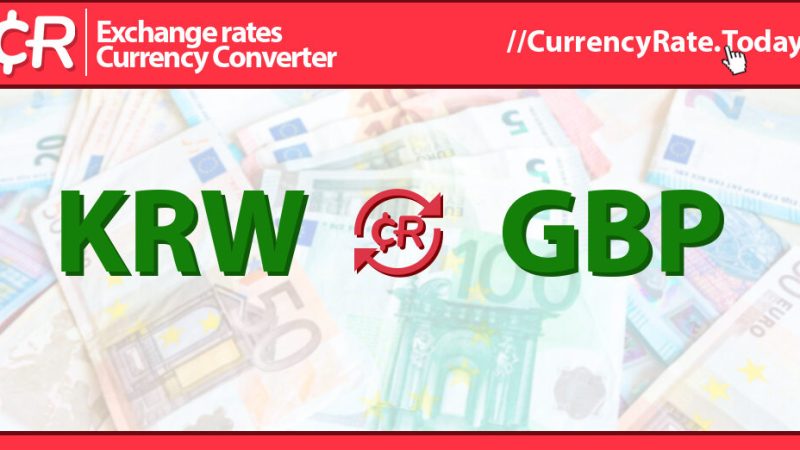The process of converting Korean to GBP might seem daunting, but with a bit of knowledge, you can navigate the process smoothly. Currency exchange rates fluctuate based on market conditions, and factors like fees, hidden costs, and exchange mediums can affect the final amount you receive. The good news is that with careful planning and the right tools, you can secure a fair rate and avoid unnecessary hassles. This guide will provide you with 10 simple steps to ensure a smooth and stress-free exchange process from Korean to GBP, while also showing you how to get the best deal.
Monitor the Korean to GBP Exchange Rate Regularly
Currency rates fluctuate constantly, and monitoring the Korean to GBP rate over time will give you a sense of when it’s the most favourable. Many websites and apps allow you to track real-time currency rates. Setting alerts can help you identify the best time to exchange your currency. If you’re not in a rush, waiting for a better exchange rate can save you a significant amount of money.
Use Online Currency Converters for Korean to GBP Estimates
Before heading to an exchange provider, use online currency converters to get a rough idea of the conversion. Websites like XE.com or OANDA provide real-time Korean to GBP rates, helping you estimate how much you should receive. Keep in mind that these rates are the mid-market rates, and actual exchange providers may offer slightly lower amounts due to fees.
Choose the Right Currency Exchange Provider for Korean to GBP Conversion
Not all currency exchange providers offer the same rates or fees. To get the best value when exchanging Korean to GBP, compare multiple options including banks, currency exchange offices, and online providers. Banks typically offer secure exchanges, while online platforms like TransferWise (now Wise) often provide better rates with lower fees.
Avoid Airport Currency Exchange Booths for Korean to GBP Transactions
Airport exchange booths are notorious for offering poor exchange rates with high fees. While they might be convenient, the rates are generally far less favourable than other options. If you need to convert Korean to GBP, it’s better to do so before reaching the airport or use an ATM once you arrive in the UK, which often offers better rates.
Consider Online Currency Exchange Services
Online currency exchange platforms have gained popularity for offering competitive rates with transparent fees. Services like Revolut, Wise, and CurrencyFair provide excellent options for converting Korean to GBP without hidden charges. These platforms are ideal if you prefer digital transfers or need to exchange large amounts at once.
Use Your Bank’s International Services
Many banks offer international currency exchange services, either at physical branches or through online banking platforms. While banks might not always have the best rates, they provide security and reliability. Additionally, some banks allow you to lock in an exchange rate for a future transfer, protecting you from fluctuations in the Korean to GBP rate.
Exchange Small Amounts for Emergencies
It’s wise to exchange a small amount of currency in advance for immediate needs, especially when travelling. This ensures you have cash for transportation, food, or other essentials upon arrival. However, avoid converting large sums at once unless the Korean to GBP rate is highly favourable.
Use ATMs Abroad
ATMs abroad often offer better exchange rates than currency exchange booths. However, be cautious of withdrawal fees, which can add up. Using a travel-friendly bank card that minimises foreign transaction fees will make it more cost-effective. Some UK banks partner with South Korean banks, allowing free or low-fee withdrawals, making this a great option for exchanging Korean to GBP.
Be Aware of Hidden Fees
Hidden fees can significantly reduce the amount you receive when converting Korean to GBP. Always ask for a full breakdown of the charges before making any exchange. Online platforms usually have transparent fee structures, while physical exchange providers may include service charges, commissions, or unfavourable exchange rates.
Know the Limits on Currency Exchange
Certain countries, including South Korea, have limits on how much currency you can take out of the country. When exchanging Korean to GBP, ensure you comply with any local regulations regarding currency export. This is especially important for business travellers or those carrying large sums.
Conclusion
Exchanging Korean to GBP doesn’t have to be a stressful experience. By following these 10 simple steps, you can ensure you get the best rates while avoiding hidden fees and pitfalls. Whether you’re preparing for a trip, sending money abroad, or just need to convert your currency, being informed will help you maximise your money. Stay patient, use the right tools, and plan ahead for a smooth currency exchange experience.
FAQs
1. What is the best way to exchange Korean Won to GBP?
The best way to exchange Korean Won to GBP is to use an online currency exchange service likeWise or Revolut, as they tend to offer better rates with lower fees than traditional exchange providers or banks.
2. How often do Korean to GBP exchange rates fluctuate?
Exchange rates fluctuate constantly due to changes in the global currency market. It’s important to monitor rates over time to ensure you exchange your money at the most favourable rate.
3. Are there any limits to how much Korean Won I can exchange to GBP?
Yes, both South Korea and the UK have regulations on how much currency you can exchange or carry across borders. Always check the latest guidelines before making large exchanges.
4. Can I use ATMs in the UK to withdraw GBP with Korean Won?
Yes, many ATMs in the UK allow you to withdraw GBP using a Korean debit or credit card. However, be mindful of withdrawal and conversion fees that may apply.
5. What is the average fee for converting Korean Won to GBP?
The fee varies depending on the provider. Online platforms typically charge between 0.5% and 2%, while banks and physical exchange providers may charge higher fees or offer less favourable rates.
Also read: Natural Sun Cream UK: 10 Best Options for Flawless Skin Protection





